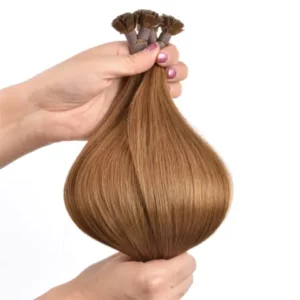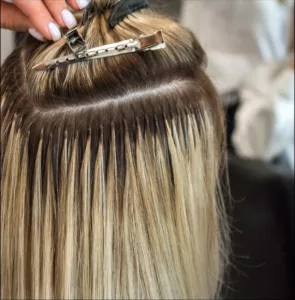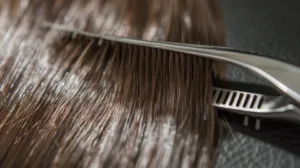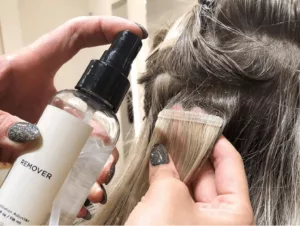Clients often want their extensions to perfectly match their natural hair. The problem is that dyeing extensions is not always simple or risk-free.
Yes, you can dye human hair extensions, but only certain types and under professional conditions. Extensions can be darkened or toned safely, but lightening is discouraged as it damages the hair and shortens its lifespan.

Extensions are an investment for salons and wholesalers. Understanding which types can be dyed, how to do it safely, and what results to expect is key to protecting both your clients and your business.
Can you dye extensions?
Stylists often face the question: can all extensions be dyed? The answer depends on the type of hair and its processing history.
You can dye 100% human hair extensions that still have intact cuticles. Synthetic, non-Remy, or heavily processed extensions cannot be dyed successfully because they lack the structure to hold pigment.
Dive Deeper: Which Extensions Respond Well
There are major differences between full cuticle, Remy, and synthetic hair:
- Full Cuticle Hair Extensions: These are the best for dyeing. They still have their natural cuticle layer intact, which means they can absorb color evenly. Darkening or toning is safe, but bleaching is still discouraged.
- Remy Hair Extensions: These may tolerate mild dyeing, but the cuticle is already partially stripped. Results can be uneven, and lifespan may be shortened.
- Non-Remy Hair Extensions: Acid-treated and silicone-coated, these cannot be dyed. Any attempt will strip away the coating and leave the hair brittle.
- Synthetic Extensions: These cannot be dyed at all. Pigments do not bond to fibers, and bleach or dye can melt the hair.
| Extension Type | Dye Compatibility | Notes |
|---|---|---|
| Full Cuticle | Yes | Best option for coloring |
| Remy | Limited | Uneven and less durable |
| Non-Remy | No | Damages hair immediately |
| Synthetic | No | Pigments cannot attach |
Salons that work with premium extensions from trusted manufacturers will have the most freedom to adjust shades. Lower-quality products will not withstand chemical changes.
Can hair salons dye extensions?
This is a question salon owners hear often from clients. They want extensions that blend seamlessly with their natural hair after coloring.
Yes, salons can dye extensions if they are made of 100% human hair with intact cuticles. Professional stylists are equipped with the right tools and knowledge to apply color safely and minimize damage.
Dive Deeper: Why Professional Application Matters
Dyeing extensions requires more precision than dyeing natural hair. Extensions cannot repair themselves with scalp oils, so any mistake is permanent. Professional stylists control every part of the process:
- Strand Tests: A small piece is tested first to predict results.
- Product Choice: Ammonia-free or demi-permanent colors are often used to minimize damage.
- Timing: Stylists monitor color development closely to avoid over-processing.
- Placement: They avoid getting dye onto bonds or tapes, which can cause slipping.
Clients who dye extensions at home often use strong box dyes or leave color on too long, leading to dryness or tangling. A salon ensures that the investment in extensions is protected.

How to dye hair extensions?
Salons and stylists often get asked how to safely dye extensions at all. The key is to follow careful steps and never skip testing.
The safest way to dye extensions is to let a professional stylist handle it. If dyeing is attempted, a strand test must always come first, followed by a structured coloring process.
Dive Deeper: Step-by-Step Professional Process
Step 1: Preparation
- Wash extensions gently to remove any product buildup.
- Dry them fully and detangle with a wide-tooth comb.
- Lay the wefts flat on foil or plastic wrap.
Step 2: Strand Test
- Apply dye to one small section first.
- Rinse and evaluate for dryness, elasticity, and color accuracy.
Step 3: Application
- Use a brush to apply dye evenly from root to tip.
- Avoid oversaturating bonds or tapes.
- Apply in thin sections to ensure full coverage.
Step 4: Processing Time
- Monitor closely. Most demi-permanent colors need 20–30 minutes.
- Never exceed the recommended time.
Step 5: Rinse and Care
- Rinse extensions with cool water until it runs clear.
- Apply a conditioner or mask to restore moisture.
- Allow extensions to air-dry on a towel before styling.
This process ensures even coloring while protecting the integrity of the extensions.
What happens if you dye hair extensions?
Clients often want to know what risks exist when dyeing extensions. The outcomes depend heavily on hair quality and method.
When dyeing is done correctly on full cuticle human hair, extensions can hold new shades well. But if dyeing is attempted on processed or synthetic hair, results include dryness, breakage, and color inconsistency.
Dive Deeper: Common Outcomes
- Positive Results: With quality hair, the dye deposits evenly, creating a seamless blend. The extensions remain soft and reusable for months.
- Negative Results: With lower-quality hair, the dye strips away silicone coating, leaving strands rough. Breakage, tangling, and fading appear quickly.
- Longevity Issues: Even premium hair may lose lifespan if repeatedly dyed. Extensions may not last the full 12–18 months.
| Outcome | On Premium Hair | On Low-Grade Hair |
|---|---|---|
| Color deposit | Even and smooth | Patchy, uneven |
| Texture | Remains silky | Becomes dry or frizzy |
| Lifespan | 9–12 months post-dye | Weeks or less |
Educating clients about these differences is vital. Dyeing extensions can work beautifully, but only under the right conditions.
How can I dye my hair extensions without ruining them?
This is the heart of the concern for most stylists and salon owners. The goal is to meet client expectations without damaging the investment.
You can dye extensions without ruining them by using professional products, applying color gently, avoiding bleach, and always conducting strand tests.
Dive Deeper: Best Practices
- Choose Quality Hair: Only work with full cuticle, single-donor extensions.
- Use Deposit-Only Products: Demi-permanent colors or glosses add tone without stripping hair.
- Avoid Bleach: Lightening is too harsh; always source lighter shades from the manufacturer.
- Moisture Care: Always condition deeply after dyeing.
- Control Heat Styling: Avoid excessive heat for several days after coloring.
Stylists should also explain maintenance routines to clients: wash with sulfate-free shampoo, use color-safe products, and avoid chlorine or hard water exposure.
What kind of hair extensions can I dye?
Not all extensions are made equal. Understanding this difference saves salons from costly mistakes.
You can dye 100% human full cuticle hair extensions safely. Synthetic, non-Remy, or already heavily processed extensions should never be dyed.

Dive Deeper: Sorting the Options
- Hand-Tied Wefts: Excellent for dyeing darker or toning. Thin, flexible, and absorb pigment well.
- Genius Wefts: Equally good, with cuttable edges that resist shedding.
- Tape-In Extensions: Can be dyed carefully, but avoid getting product on adhesive.
- Keratin/U-Tip Extensions: Dyeing is possible, but keep heat-bond areas untouched.
- Clip-In Extensions: Can be dyed, though they often receive heavier use, so lifespan may shorten faster.
| Extension Type | Dye Safety | Notes |
|---|---|---|
| Hand-Tied Wefts | Yes | Tone or darken easily |
| Genius Wefts | Yes | Very stable and versatile |
| Tape-Ins | Limited | Must protect adhesive area |
| Keratin/U-Tip | Limited | Avoid coloring the bond tips |
| Clip-Ins | Yes | Shorter lifespan post-dye |
Salons should always inform clients that while dyeing is possible, the safest route is to order pre-colored extensions directly.
My Opinion
As a manufacturer, I always recommend choosing the correct color at the time of purchase rather than relying on dyeing later. Dyeing is possible, especially with full cuticle human hair, but it always carries some risk. If clients insist, I advise having the work done by a professional stylist, starting with a strand test. From a factory perspective, the most professional and reliable solution is to stock multiple shades of premium extensions so salons can meet client needs without resorting to additional chemical processing.
FAQ
Can you bleach extensions to make them lighter?
No. Bleaching damages extensions beyond repair. Always buy lighter shades from the start.
Can I dye synthetic extensions?
No. Synthetic fibers cannot absorb pigment.
Do extensions need special products after dyeing?
Yes, always use sulfate-free, color-safe shampoos and conditioners.
Can tape-ins be dyed?
Yes, but avoid applying dye to the adhesive tabs.
Will dyeing shorten the lifespan of extensions?
Yes, especially if done repeatedly. Even full cuticle hair may lose months of wear.
Is it safer to go darker than lighter?
Yes, darkening or toning is much safer than lightening.
How do I match extensions to a client’s hair color?
Either choose pre-colored extensions or use demi-permanent dye to adjust slightly.
Can salons tone extensions like natural hair?
Yes, toning is safe and effective for adjusting brassiness.
Why do manufacturers discourage bleaching?
Because extensions have already been processed and bleaching again causes irreversible damage.
What extensions last longest after dyeing?
Full cuticle hand-tied or genius wefts dyed darker can still last 9–12 months with care.
Conclusion
Dyeing extensions is possible but requires caution. Always use full cuticle human hair, avoid bleach, and rely on professionals to protect the investment.
Hibiscus Hair Manufacturer has been dedicated to producing high-quality hair extensions for 25 years and is a recognized leader in the industry. If you are interested in finding a reliable hair extensions supplier and wholesale for your brand, please visit our website for more information:
HOME





